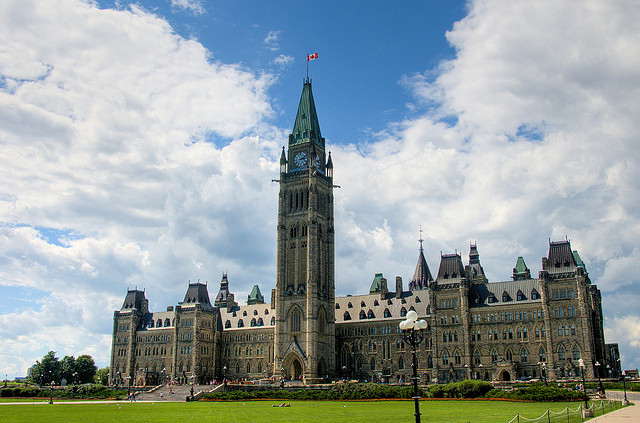Building on a successful House of Commons session last spring, featuring an exposé of over-spending by prominent Conservative-appointed Senators Mike Duffy and Pamela Wallen, Tom Mulcair has been on an extensive NDP campaign tour across Canada calling for Senate abolition.
Tying Prime Minister Harper to a spending scandal is a way to discredit him as someone Canadians can trust to mind national finances. Calling for Senate abolition distinguishes the NDP from the Liberals, the party strongest in the polls.
Making yourself heard, getting attention for your favourite subjects, and rallying support is what preoccupies leaders of Canada’s five political parties, Stephen Harper, Tom Mulcair, Justin Trudeau, Daniel Paillé and Elizabeth May, as they prepare for key upcoming events. Parliament opens October 16 with a speech from the throne, and the next federal election is scheduled for two years later.
For a leader to mount a successful challenge to public perception requires overcoming a big obstacle: it is more difficult to get rid of entrenched old ideas than to get bright new ones adopted. The status quo starts with an advantage, no matter how desperate many people may be to see a change.
For Stephen Harper the objective has not changed. He wants those who voted him a majority in 2011 to continue to see the Conservatives as the best choice to manage economic affairs. Harper continues to narrow cast, looking to shore up support in Western Canada for his energy superpower agenda, and in Ontario suburbs with his balanced budget fiscal conservatism.
The Harper government plans to start the next parliamentary session with a consumer-friendly agenda, looking to cash in on the unpopularity of bank charges, cell phone fees and airline ticket pricing practices. According to Paul Wells, author of a Harper biography appearing this fall, the Conservatives have yet to deliver on similar promises made in past throne speeches.
The short-term goal of the Conservatives is to sell their free trade agenda as another guarantee of economic prosperity. The conclusion of a deal with Europe is being predicted, and managing opposition to its provisions will be a serious political test.
As part of using sports to soften his image, the prime minister has authored a book on hockey that will be on sale soon. More hockey talk, less political analysis works for Conservatives.
Justin Trudeau wants to build on his personal popularity by surrounding himself with competent newcomers to politics. So far the Liberal leader has recruited Andrew Leslie, a Canadian general, to advise him on international affairs and defence policy, and noted journalist Chrystia Freeland to work out an economic program to address the current squeeze being applied to the middle class. For the coming Montreal by-election in the Bourassa riding, Trudeau was happy to welcome Emmanuel Dubourg, elected three times to the Quebec National Assembly, as the Liberal candidate.
To overcome lingering doubts about his leadership credentials that will arise in the next election campaign, Warren Kinsella counsels Trudeau to mimic Jean Chrétien faced with similar doubts in 1993: “I’ve got the team, I’ve got the plan”; importantly, the plan is not revealed until the election is underway.
As leader of the Green Party, Elizabeth May speaks for environmental sanity, an ideal that a wide majority of citizens share. While frustrated by inaction from business and governments, few see the Green Party as their chosen electoral vehicle for change. May has won points, showing a solitary MP can command attention. Her challenge is to replicate that success in other ridings.
Daniel Paillé of the Bloc Québeçois is a leader without a seat, of the fourth party in the House of Commons. With only four seats, the Bloc does not merit official party status. Its leader emerged from obscurity only to receive wide condemnation for his decision to exclude MP Maria Mourani from caucus because she objected to the PQ Charter of Values.
Mourani was on sound ground since her concerns about banning the wearing of religious symbols was in line with Bloc party policy. Paillé, however, wants to fight the next election with the support of the PQ. Forced to chose between undermining support for the PQ Charter, already shaky on the island of Montreal where Mourani held the only Bloc seat, and party policy, he made what many sovereignists consider to be the wrong choice.
As leader of the Official Opposition, Tom Mulcair is clearly set on undermining the credibility of the Harper government by using Senate over-spending or any issue which resonates with the public. The NDP will raise issues dear to membership such as abolishing the Senate, or introducing proportional representation, so as to keep its support from slipping to the Liberals. Mulcair has championed sustainability from his first days in politics, and the issue gives him personal credibility.
A recent opinion poll assessing party leaders reveals Mulcair generates lower negatives across the board than either Harper or Trudeau.
Over the next two years, the NDP challenge is to inspire Canadians to vote for the party because of the way it addresses the pocketbook issues that matter most at election time.
Duncan Cameron is the president of rabble.ca and writes a weekly column on politics and current affairs.
Photo: Chris Fane/flickr



